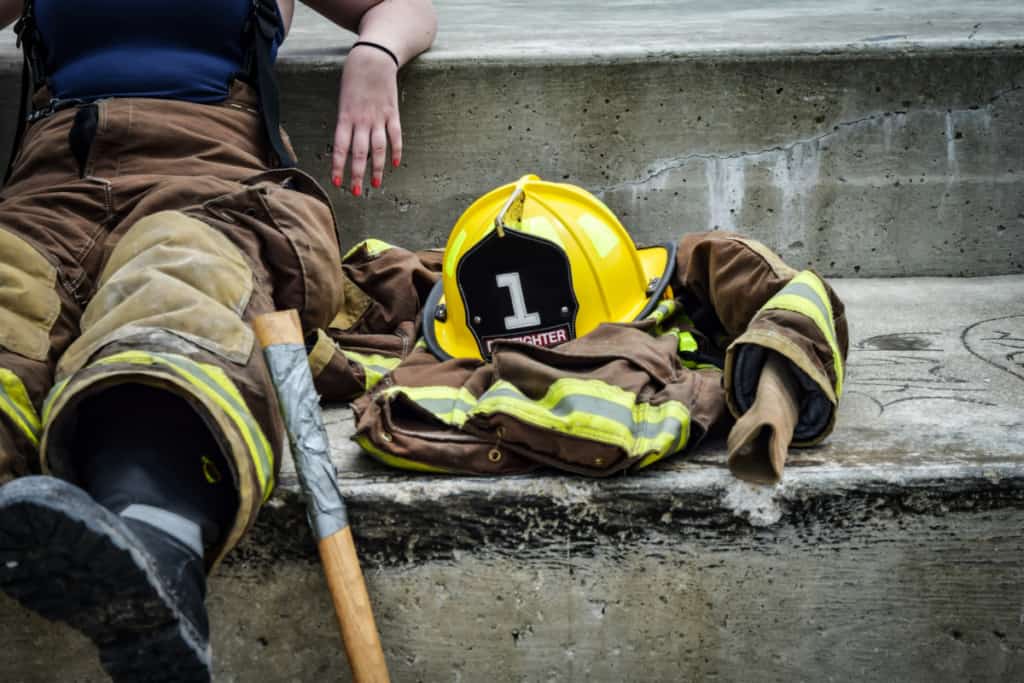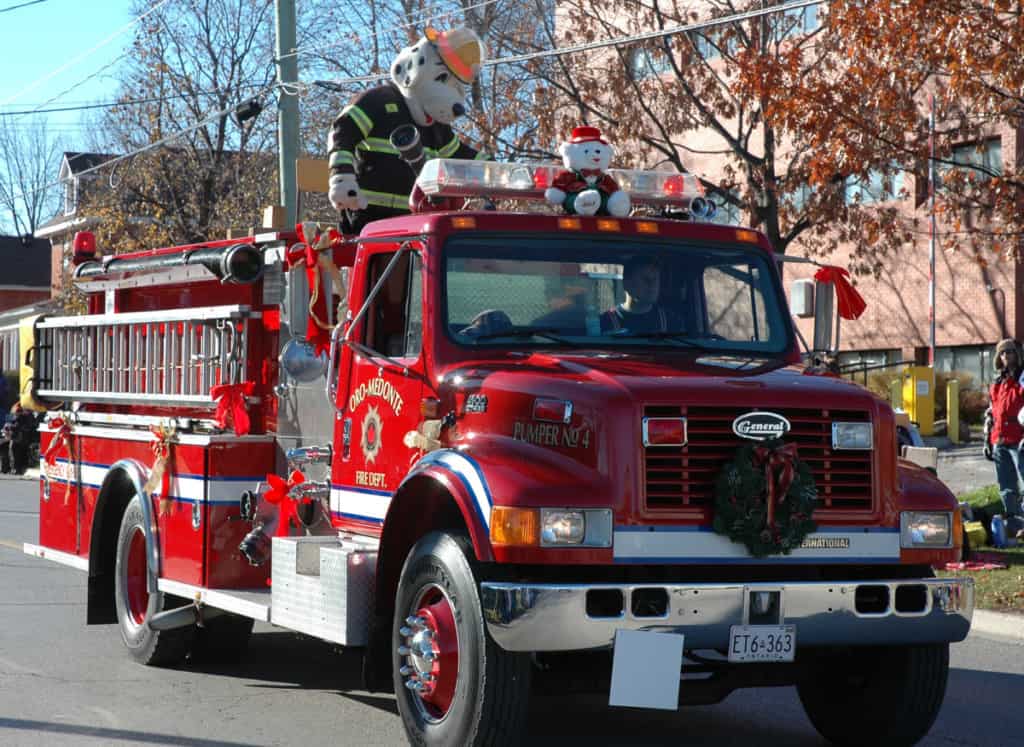There’s no doubt about it, everywhere you look in America today, people are looking larger than ever. Obesity is a national crisis and one to which there appears to be no end in sight. Even the news that 90% of coronavirus victims are obese doesn’t seem to have inspired much slimming down, but can firefighters be fat or out of shape? Is there a bodyweight limit to be a firefighter?
Most fire departments in the US don’t have a weight limit for firefighters. Some departments have bodyfat restrictions, but they usually only apply to new recruit firefighters. Many departments do have annual physical performance tests for all firefighters to ensure they are fit enough to do their job.
Many professions, including firefighters, have employees who do not maintain a healthy body weight. This is a controversial topic for many. Here’s what you need to know about firefighters and body weight.
Your # 1 priority is keeping your family safe. As a firefighter, I recommend everyone has updated smoke detectors that don’t require battery changes, like these ones from Kidde, a fire extinguisher, like this one from Amerex, and a fire escape ladder if you have bedrooms above the first floor, I recommend this one from Hausse.
Also read: The Fitness Requirements for a Firefighter – Explained
Is There A Weight Limit For Firefighters?

No, as we said at the start, at this moment in time, there is no formal weight limit for firefighters (as far as I know). Maybe there should be a sliding scale based on BMI? However, BMI doesn’t seem to be a reliable metric.
What we can tell you is that some fire departments use a measure of body fat to determine who can join. But this only applies to the new hires, and there is no oversite of a firefighter’s body fat after they are hired.
The City of Los Angeles, for example, specifies a maximum body fat percent of 22% for female firefighters and 17% for males, but only at the point of recruitment.
Once recruited, firefighters unlike professional athletes or airline attendants are left to their own devices when it comes to their weight.
(The exception is Hotshot firefighters who must meet weight limits for helicopter maximum load capacity.)
Are Some Firefighters Fat Or Out Of Shape?
Yes. In fact, obesity is increasingly common in the fire service in the United States and we’re not alone, the problem is increasing in other developed nations too. It mirrors the trend of obesity in the general population but it is a particular problem for the profession.
It ought to be obvious but the fatter that a firefighter is, the harder it is for them to stay in shape and the less ready that they become to carry out their duties.
More alarmingly, in the study, “The Prevalence of Overweight, Obesity, and Substandard Fitness in a Population-Based Firefighter Cohort” they noted that firefighters die disproportionately when compared to other emergency services, of coronary heart disease.
Coronary heart disease is often a direct result of obesity and a lack of general fitness, it is the number one killer of people in the fire service today, far more firefighters have heart attacks on the job than from other job-related causes.
However, it is important to note that that the proportion of firefighters who are severely obese (that is they have a BMI of over 35 and have at least two “comorbid conditions” (the most likely of which are going to be hypertension and sleep apnea, at least to begin with) is still lower than in the population at large.
The presence of severely obese people in the fire service should be deeply worrying though, given that it brings the risk of severe and negative occupational outcomes!
It is also worth noting that the United States leads the world in severely obese firefighting staff, a record that we should, perhaps, not be very proud of.
Even if this is all true. We can’t judge a book by its cover. I have met plenty of larger firefighters that are very athletic and great at their job. Just because you are heavier, does not necessarily mean you are unable to be great at your job.
What Percentage Of Firefighters Are Obese?
The CDC in their report “Preventing Chronic Disease” found that an incredible 70% of modern firefighters are either overweight or obese. Yet, despite this figure, the majority of firefighters have received little to no advice to lose weight or any support to help them to do so.
When comparing data between fire departments with active wellness programs for firefighters and those without, it becomes clear that this support is important.
Firefighters with support are much less likely to be overweight or obese and are almost 2/3 less likely to be severely obese.
Obesity, in case, you were wondering is classified using the BMI-scale (Body Mass Index) and while there is some dispute over this scale’s accuracy, the research within the fire service showed it to be a remarkably accurate predictor of body fat ratios and waist circumference too. Thus, it’s accuracy is more than good enough for the purposes of assessing obesity in the service.
Obese firefighters were also found to be very high risk for “metabolic syndrome” a condition that is linked to both heart problems and to Type 2 diabetes.
Are There Skinny Firefighters?
On the other side of the scale, excuse the pun, there has been much less research done on “skinny” firefighters (this may well be because there is no formal definition of the word “skinny” nor a scale to measure it on as there is with obesity).
However, it is fair to say that there are skinny firefighters based on simple observation of firefighters in the field and yes, many of them carry out the job with no major challenges.
They may have more difficulties with some of the strength-based physical tasks firefighters are required to perform, but not necessarily. If a firefighter is able to safely and effectively perform their duties, then there is no reason they can’t be on the slimmer side.
What is most likely true is that skinny firefighters are far more likely to reach the end of their careers without severe health problems than those who are severely overweight.
Firefighter Physical Fitness
There are four main components of firefighter physical fitness and they can all be affected by obesity:
- Cardiorespiratory Endurance – basically a measure of how long you can work at your maximum rate. This declines with age and most people can only manage short bursts of this kind of work. However, it will decline far more rapidly if you are overweight and more again if you have heart problems.
- Flexibility – you need to be able to balance and to reach for things as a firefighter. The bigger you get, the harder that this becomes. This can lead to increased levels of injury on the job and may lead to arthritis and joint problems later in life too.
- Muscular fitness – there’s no doubt that a larger person will, initially, build up greater levels of muscular strength in their youth, they have to – they’re carrying more weight than a smaller person, all the time. However, strength is only one part of the fitness required for firefighters to be proficient.
- Body composition – this is the ratio of body fat to the fat-free mass that you have. It ought to be fairly obvious how getting fatter will make this ratio worse. However, the lower this ratio the more effective that your metabolism is likely to be and the less likely you are to suffer from metabolic disorders.
There is some good news amongst all this. You do not have to remain obese if you become obese.
You will probably need to adopt a reduced-calorie diet and combine it with exercise, if you want to regain your shape and fitness levels. You may need to seek help and support to do so, but it will be worth it and you will probably be healthier and maybe even live longer for it.
Also read: 8 Tips for the Firefighter Physical Test: Passing the CPAT
Conclusion
Is there a weight limit for firefighters? No, because these policies would probably be perceived as discriminatory, but many fire departments may examine the body fat ratio of their recruits and make hiring decisions based on this and that does impose a weight limit of sorts, except for those who are super muscular, that is.
That doesn’t mean that there shouldn’t be a weight limit. In truth, firefighting is a hard, physical job, and that so many firefighters are now carrying extra weight should be alarming. The fact, that the number one way to die on the job is a coronary incident, probably linked to excess weight should be more alarming still.
Related Articles:
How to Become a Firefighter: The Complete Guide

